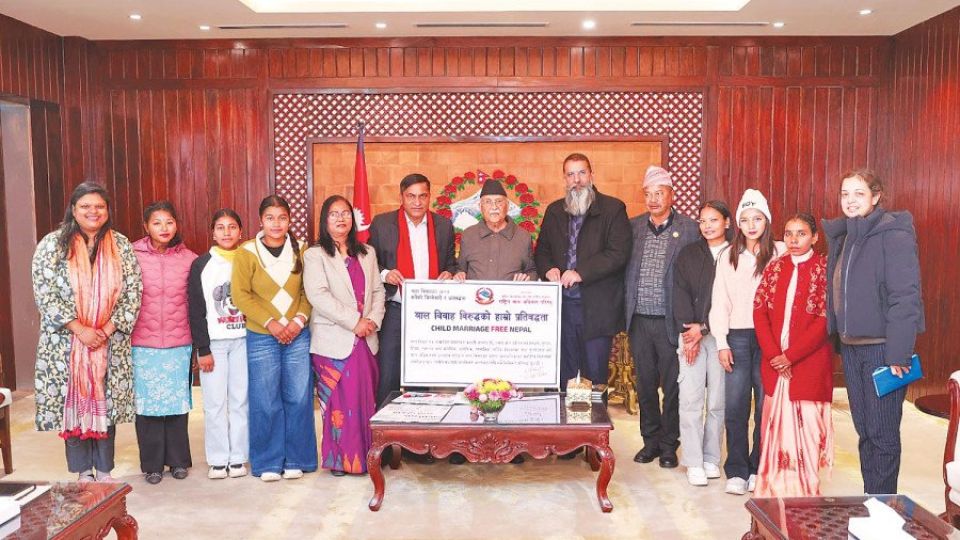January 2, 2025
KATHMANDU – On Tuesday, Anita, a child marriage survivor and campaigner for child rights, made a plea for the eradication of child marriage.
Speaking with Prime Minister KP Sharma Oli at his residence in Baluwatar, Anita, who the Post is identifying with a pseudonym to protect her privacy, shared her harrowing experience of being married at the age of 5 and giving birth at 15.
“I was a child when I got married, and I didn’t even know what child marriage was,” Anita, who hails from Nepalgunj, told the Post. “But when I was sent to live with my husband, life turned into hell. While I was struggling in the hospital during childbirth, my only thought was, ‘Please save my child. No 14-year-old should have to go through this.’”
Anita’s marriage and her subsequent pregnancy were riddled with complications that endangered both her and her child’s lives. At the time, her husband was only 16, unemployed, and lacked the means to support a family. Anita was also barred from continuing her education after class 10, leaving her with little hope for a future beyond the confines of marriage.
“People speak of hell and heaven, but at that point in my life, hell was real,” Anita told the prime minister. “Child marriage is hell. It must end.”
Her visit was part of the ‘National Campaign for a Child Marriage-Free Nepal 2024’ launched by National Child Rights Council (NCRC) and Just Rights for Children (JRC), a network of civil society organisations.
Prime Minister Oli expressed full support for the initiative, signing a pledge to eliminate child marriage in Nepal. The pledge signing event at the prime minister’s residence was attended by former Minister for Women, Children, and Senior Citizens Bhagwati Chaudhary, former Chief Minister of Lumbini Province Dilli Bahadur Chaudhary, and Bhuwan Ribhu, founder of India’s ‘Just Rights for Children’.
Alongside this meeting, the NCRC organised an interaction programme in Lalitpur, where government officials, child rights activists and development partners reaffirmed their commitment to ending child marriage.
The programme highlighted the persistent challenge of child marriage in Nepal, despite the fact that the practice was outlawed in 1963.
According to a 2024 study report ‘Behavioural Determinants of Child Marriage and Adolescent Pregnancy in Nepal’, child marriage is intertwined with societal norms, economic conditions, and cultural expectations. The report, a collaborative effort between the Nepal Health Research Council and UNICEF, outlined how child marriage perpetuates cycles of poverty and inequality in Nepal.
Despite the legal framework in place—including the Civil Code of Nepal, which prohibits child marriage, and the Children’s Act, 2018—the practice continues due to weak implementation and social normalisation.
Minister for Women, Children, and Senior Citizens Nawal Kumar Sah Sudi said that laws alone do not suffice. “We need to work on enforcing these laws,” he said. “They must not remain only on paper. We must implement them at all levels—federal, provincial, and local.”
Ribhu, a global advocate for children’s rights, said that when a minor is married and sent to live with a husband, “it is nothing short of rape and a crime.” “Nepal has strong laws, but it’s high time they are implemented,” he said. “If Nepali people can conquer Mount Everest, they can certainly conquer child marriage too.”
Meanwhile, Minister for Sports and Social Welfare in Madhesh Province Pramod Kumar Jaiswal drew attention to regional and cultural factors that contribute to child marriage. “In Madhesh, the causes are complex,” he said. “It’s not just dowry anymore—there’s a fear of children eloping. Parents feel pressure to marry off their daughters before they reach the legal age so they do not elope, which they consider a blow to their social prestige. We need to keep a check on that.”
Jaiswal also highlighted the Madhesh Province’s fresh efforts, including the Girl Child Protection and Empowerment Act, 2081, and the upcoming ‘Beti Zindabad’ movement aimed at empowering girls and tackling dowry- and child marriage-related issues that disproportionately affect young girls.
“We need to research and study the unique social and cultural causes of child marriage in all the provinces,” Jaiswal said. “We cannot have a blanket approach.”
Moreover, Social Development Minister for Lumbini Province Janmajay Timilsina said that there’s a disconnect between government data, NGO reports, and media coverage. “We need real, grassroots data to understand the scale of the problem and how to address it effectively,” he said. He also pointed out that child marriage is often normalised in rural areas, making it all the more difficult to combat.
In a symbolic gesture of hope, a candle-lighting ceremony was held in Bhrikutimandap, Kathmandu on Tuesday, where over 100 activists, survivors, and stakeholders gathered to show their commitment to ending child marriage. The candles illuminated in the evening symbolised the collective resolve to bring about change.
As part of the National Campaign, each province has pledged to establish an alliance of provinces by the end of Magh 2081 (February 2025), and local alliances by the end of Chaitra 2081 (April 2025). These alliances will work across national, provincial, and local levels, with a shared responsibility to implement laws, educate communities, and ensure that children are protected from the dangers of early marriage.
Globally, Nepal ranks 16th among countries with the highest prevalence of child marriage, and in South Asia, it ranks third after Bangladesh and India.
The Nepal government aims to end child marriage by 2030 as part of its commitment to UN’s Sustainable Development Goals (SDGs).
Speaking at the event, Ranju Kumari Jha, a member of the parliamentary Law, Justice, and Human Rights Committee, highlighted that the constitution envisions the best interest of children.
“But without proper laws and action, there will be no meaningful progress,” she said. “With only six years remaining to meet the target, it is high time we spring into action to protect children from the various risks and impacts of child marriage.”


